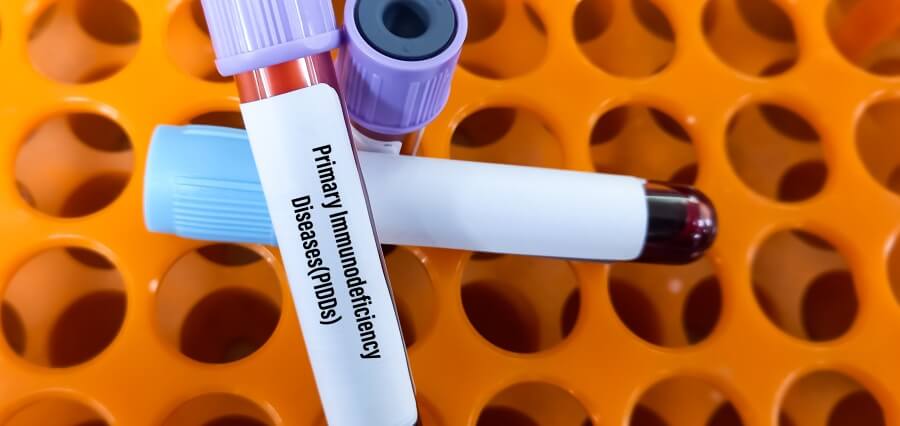Primary immunodeficiency disorders (PIDDs), also known as inborn errors of immunity (IEI), or primary immune disorders, are chronic conditions characterized by missing a part of the body’s defense system, and a weak, or dysfunctional immune system, exposing the body to infections and diseases. Although these disorders are rare, they are serious diseases that can significantly cause morbidity and mortality, especially at young ages.
This article explains the causes, clinical manifestations, diagnosis, and treatment of PIDDs. (1–4)
Causes of Primary Immunodeficiency Disorders (PIDDs)
Unlike secondary immunodeficiency disorders, which occur due to a related medical cause, such as viral infections or chemotherapy treatments, primary immunodeficiency disorders are internal defects in the immune system present from birth.
The exact mechanism of PIDDs is not well understood. These disorders are usually inherited; passing down from parents to children, though, they can also occur sporadically.
Genetic mutations, regardless of age, can affect the immune system, leading to:
- Parts of the immune system are less functional than normal.
- Defective parts of the immune system.
- A total absence of the immune system.
These genetic mutations can occur in the following immune cells:
- B lymphocytes (responsible for 50-60% of PIDD cases)
- T lymphocytes
- Natural killer (NK) cells
- Phagocytes
Clinical Manifestations
There are over 400 types of primary immunodeficiency disorders, each varying in intensity and can affect any part of the body. PIDD symptoms include:
- Persistent infections.
- Severe infections.
- Unusual, difficult-to-treat infections.
- Requiring multiple courses of antibiotics to treat infections.
- Delay in growth and development.
- Gastrointestinal symptoms include abdominal cramps, unintentional weight loss, and chronic diarrhea. Additionally, inflammatory bowel disease can occur.
- Respiratory symptoms, such as recurrent pneumonia, sinusitis, and bronchitis.
- Blood disorders, such as autoimmune hemolytic anemia and vasculitis.
Diagnosis
These disorders are rare and diverse in clinical manifestations, making diagnosis challenging. Healthcare providers should thoroughly perform diagnostic approaches, including:
- A detailed medical history, including a family history of autoimmune disorders.
- Physical examination.
- Laboratory tests, such as:
- Blood tests to assess immunoglobulin levels, immune cell counts, size, and function.
- Genetic testing to detect genetic mutations.
- Flow cytometry to examine samples of immune system cells.
Certain guidelines developed by The World Health Organization (WHO) and other organizations help detect PIDD. For example, having eight or more new ear infections per year and a family history of primary immunodeficiency disorders, are warning signs to PIDs.
Management and Treatment
1.Infection Prevention
Preventing the risk of infections, frequency, and severity can include prophylactic antibiotics, immunoglobulin replacement therapy, and vaccinations.
2. Immunomodulation
For patients with PIDD who develop autoimmune complications, medications can be prescribed, such as:
- Corticosteroids: To reduce inflammation and suppress the immune response.
- Immunosuppressive Agents: Drugs like methotrexate, azathioprine, and cyclosporine can be used in severe autoimmune diseases to manage the overactivity of the immune system.
- Targeted Biologic Therapies: Monoclonal antibodies play essential roles in treating complications of PIDs.
3. Curative Therapies
Curative therapies can target the underlying genetic mutation responsible for the PIDD.
- Hematopoietic Stem Cell Transplantation (HSCT): This involves transplanting stem cells from a healthy donor, in severe cases of PIDs. The success of this procedure depends on the availability of a suitable donor, the transplant timing, and the patient’s overall health.
- Gene Therapy: This promising therapy approach targets defective genes, permanently correcting the underlying mutation.
References
- https://my.clevelandclinic.org/health/diseases/17964-primary-immunodeficiency
- https://www.mayoclinic.org/diseases-conditions/primary-immunodeficiency/symptoms-causes/syc-20376905
- https://www.niaid.nih.gov/diseases-conditions/types-pidds
- https://primaryimmune.org/understanding-primary-immunodeficiency/what-is-pi
Read More: Click Here









